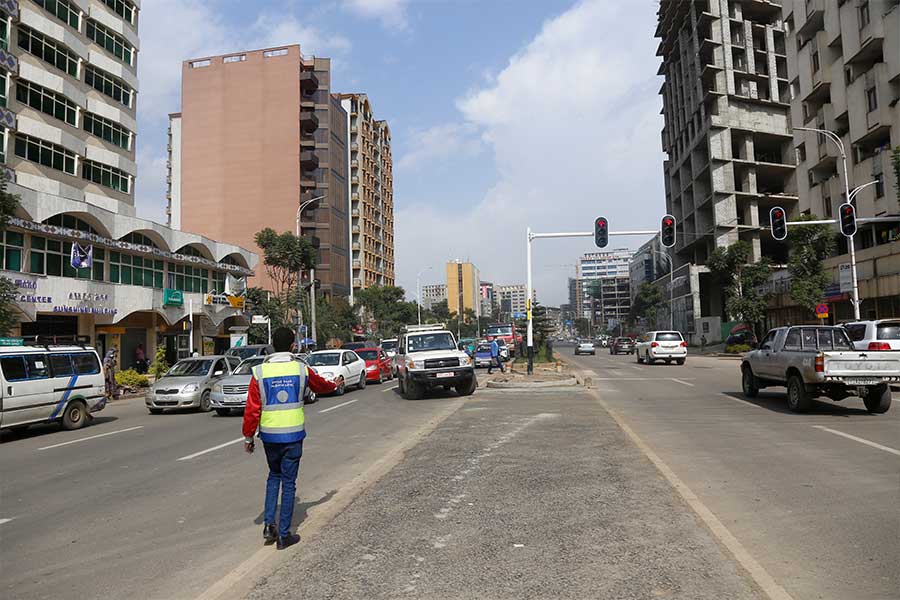
As I drove along Ayat 49 Mazoria one late evening, a headlight of a motorbike propped against the road median on the empty highway was spotted. A young man was lying unconscious on the other side of the road.
He was lucky that the headlight illuminated the dimly lit street; otherwise, he would have had to endure the existential risk of being run over due to poor visibility. Passerbys recognised him as an auto mechanic residing in the neighbourhood. Some attempted to wake him up, calling his name and pouring water on his face. As he finally gained consciousness, the crowd was taken aback by the strong alcohol odour coming from his breath. While a few friends tried to help him to his feet, it was clear that the man was highly intoxicated.
Driving a motorbike in this state is nothing short of playing with fire. I would not be surprised if he sustained a concussion since he wore no safety helmet.
A steady influx of people has put tremendous pressure on the city and the transport system, while sidewalks are inadequate and substandard. Road accidents spiked as the number of vehicles increased at a high rate than the development and upgrade of the road infrastructure in the capital. In the last six months, over a couple of hundred people have lost their lives due to road traffic accidents; half are aged between 20 and 49.
I usually come across disastrous accidents from the previous night, resulting from intoxication, exhaustion or sheer lack of adherence to the rules due to the absence of law enforcement. It is sad to see that most result in fatality and severe damage to property.
For someone who lives on the outskirts of Addis Abeba and has to commute to a distant workplace like me, it is advisable to leave home before 6:30 am to avoid getting stuck in a traffic jam. A matter of five minutes would translate to half an hour delay amidst the stressful journey. The anxiety as drivers fidget in the slow-moving traffic tends to bring out the worst in everyone. Honking the horns nervously in standstill traffic does not add any value but rather provokes a hostile reaction from equally stressed drivers. It involves the need to continuously step and release the brakes, equally exhausting for the driver as it is for the car.
Despite the road-building measures undertaken over the last decade, the road infrastructure in the capital is far from being well-developed, with high rates of rural-to-urban migration and increased vehicle numbers outpacing the efforts. The subdued synergy between institutions as they commence construction has led vehicles, pedestrians, vendors and animals to share the same road.
The observation of traffic rules seems viable when the traffic police are around. The main motivation for driving safely should not be the fear of the law enforcing traffic police but rather the loftier idea of respect for road safety and the sanctity of life.
Drivers seem to have little appetite to accommodate the "right of way" concept —instead, “might is right” appears to be the modus operandi. Speeding and unruly behaviour often result in irreversible loss of property, life and physical injury.
Pedestrians are also not well-versed with the traffic rules they need to follow. One may jump into high-speeding vehicles when the traffic light signals green for motorists. The wretched condition of the road contributes, as open manholes, narrow to the non-existent pavement, street peddling and sheer congestion result in pedestrians stepping into the main road.
The poor illumination of the roads at night and weather conditions contribute to poor visibility. Various sections of the city do not have sufficient roadside lighting, and intermittent lighting also occurs in those with existing ones. The road around the Bole Homes area qualifies to fulfil all adverse conditions as poorly lit, with no pavement for pedestrians, and full of potholes. Although lasting the rainy season in the absence of proper drainage is doubtful, it was maintained with fresh asphalt recently.
Many road accidents occur in the capital due to the multiple road menaces and the weak layer of hazard prevention systems. The recurrence and problems associated with accidents will continue to damage the economy and subsistence-level livelihoods. Risk is a probability of an unfavourable or harmful occurrence which can be exacerbated or mitigated by various factors. Adverse risk factors such as drunken driving, lack of respect for the law, and bad road conditions compound the odds of an accident.
When hazards are left unaddressed, it presents an opportunity to take preventive measures. Reactive risk management is costly and insufficient in preventing accidents, as it only deals with immediate factors.
The Swiss cheese model metaphor is used in risk analysis and risk management, studying different layers of hazards to explain the occurrence of system failures. Hazards are prevented from causing losses by a series of barriers where each has unintended weaknesses, or holes – creating a similarity with Swiss cheese. If every hole aligns in all the plates and the hazard makes its way out through the last plate, it signifies the actualization of an accident.
The risk assessment model is essential in the capital, where there is a booming population of people and vehicles and a conundrum of problem proportions. Law enforcement, modern traffic management systems, infrastructure development, and public education are needed to minimise road accidents and ensure safety. The economy can not afford a traffic system marred with inefficiency, hazards, and a lack of awareness.
Compared to many nations, the traffic management system in the country is in its infancy. In Germany, pedestrians can control upcoming vehicles by a touch on a device installed by the roadside, while traffic lights may be programmed to set the duration of green, yellow or red based on the volume of traffic. Additionally, subways, overhead bridges and bicycle ways are used to separate pedestrians from motorists.
The overstretched traffic police officers in the capital are a prevalent problem where ticketing for traffic offences is seen as scarier than the consequences of reckless driving. The manner in which traffic infractions are dealt with casts doubt on the integrity of the motorists and traffic police, leading to repeated offences. This practice beats the purpose of ticketing, which is to educate through punitive measures.
The roadside is filled with anything from wheelbarrows laden with fruits to clothes on the backs of street peddlers to children with the portable weight measuring scales to live animals walking on the street. The haphazard manner in which vehicles, people and animals interact on the road leaves one wondering if there is a way out of the debacle.
During rush hour, it is dizzying to watch the seemingly endless flow of people and cars, not to mention the high level of sound and air pollution. The pollution level measured by Real-time Air Quality Index (AQI) showed 151 on June 2023, based on the locality of the US embassy, which is categorized as “unhealthy”. It is a major issue that is yet to be addressed. The worst score is 189 around the Black Lion Hospital, while the reading for areas around the Vatican Embassy, where I grew up, and my parents still reside, shows a 105 reading labelled as “unhealthy for sensitive groups”.
Addis Abeba needs a smooth, robust traffic system and a sustainable, green development model to create a well-functioning metropolis. We can be optimistic if we focus on filling the cheese's holes and capitalise on the current state to change adversity into opportunity.
PUBLISHED ON
Jun 17,2023 [ VOL
24 , NO
1207]


Fortune News | Jun 27,2020

Sunday with Eden | May 01,2020

Fortune News | Jun 17,2023

Addis Fortune | May 07,2022

Radar | Oct 03,2020

Viewpoints | Oct 08,2022

Radar | Jan 03,2021

Fortune News | Dec 01,2024

Radar | Nov 11,2023

Radar | Apr 30,2021

Dec 22 , 2024 . By TIZITA SHEWAFERAW
Charged with transforming colossal state-owned enterprises into modern and competitiv...

Aug 18 , 2024 . By AKSAH ITALO
Although predictable Yonas Zerihun's job in the ride-hailing service is not immune to...

Jul 28 , 2024 . By TIZITA SHEWAFERAW
Unhabitual, perhaps too many, Samuel Gebreyohannes, 38, used to occasionally enjoy a couple of beers at breakfast. However, he recently swit...

Jul 13 , 2024 . By AKSAH ITALO
Investors who rely on tractors, trucks, and field vehicles for commuting, transporting commodities, and f...

Nov 1 , 2025
The National Bank of Ethiopia (NBE) issued a statement two weeks ago that appeared to...

Oct 25 , 2025
The regulatory machinery is on overdrive. In only two years, no fewer than 35 new pro...

Oct 18 , 2025
The political establishment, notably the ruling party and its top brass, has become p...

Oct 11 , 2025
Ladislas Farago, a roving Associated Press (AP) correspondent, arrived in Ethiopia in...